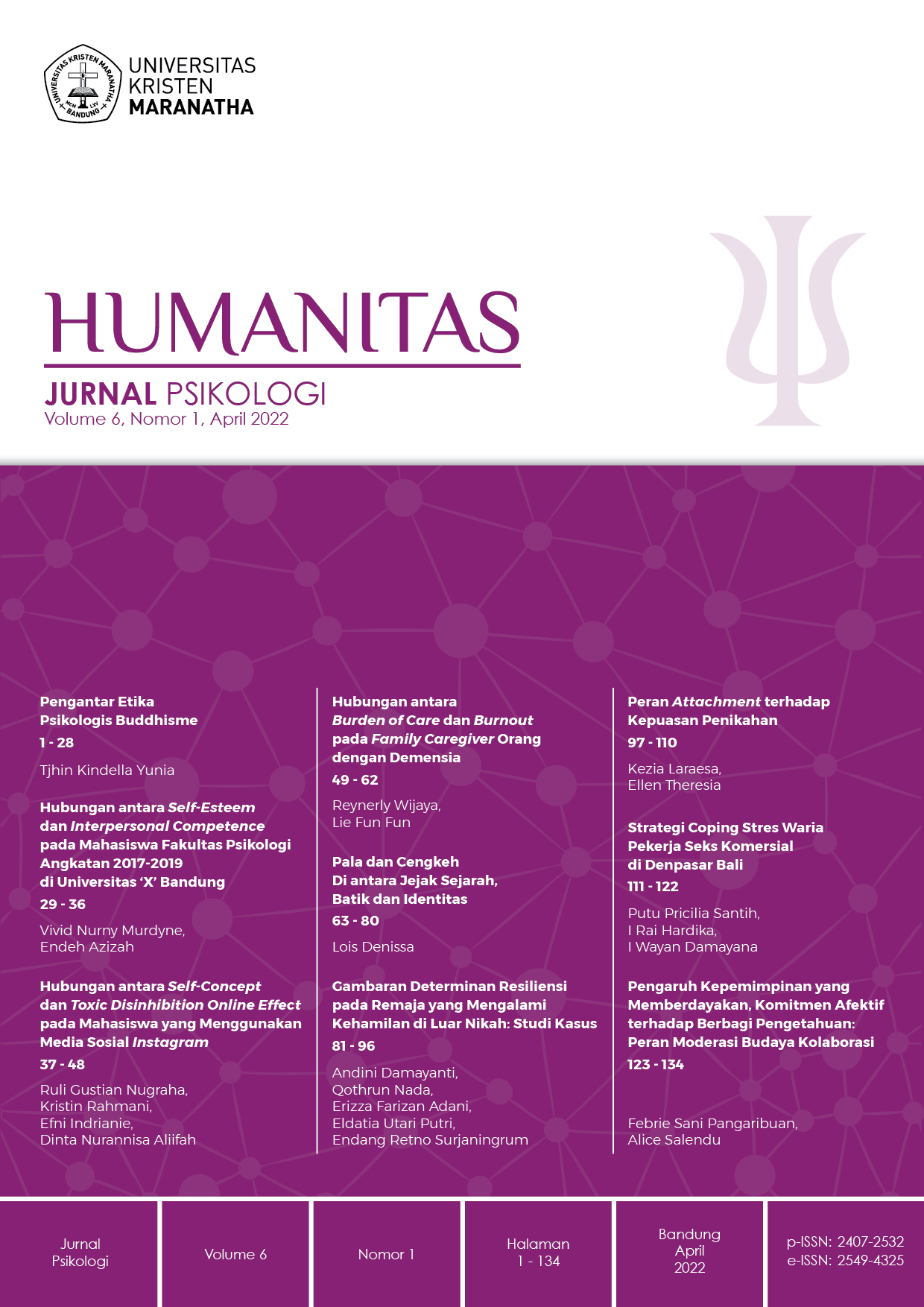Introduction to Buddhist Psycholgy
Main Article Content
Abstract
Downloads
Article Details

This work is licensed under a Creative Commons Attribution-NonCommercial 4.0 International License.
References
Aich, Tapas Kumar. (2013). Buddha Philosophy and Western Psychology. Indian J Psychiatry 55: Indian Mental Concepts I – Supplement, 165-170.
Anderson, Carol S. (2013). Pain and its ending. New York. Routledge.
Bodhi, Bhikkhu. (2012). A Comprehensive Manual of Abhidhamma. Washington. BPS Pariyatti Editions.
Bodhi, Bhikkhu. (2020). The Noble Eightfold Path. Washington. BPS Pariyatti Editions.
Chaplin, J.P. (2011). Kamus Lengkap psikologi (Dr. Kartini Kartono, terjemahan). Jakarta. PT Raja Grafindo Persada.
Compton, William. (2012). Eastern Psychology: Buddhism, Hinduism, and Taoism. North Charleston. CreateSpace
Cycleback, Maskil David. (2021). Eastern Versus Western Psychology. Diunduh 22 September 2021 dari https://cycleback.wordpress.com/2020/07/04/eastern-versus-western psychology/
Davids, Caroline A.F. Rhys. (2016). A Buddhist Manual of Psychological Ethics. Oxford. The Pali Text Society.
Endraswara, Suwardi. (2017). Filsafat Ilmu. Yogyakarta. CAPS (Center for Academic Publishing Service).
Feist, Jess, Gregory J. Feist, Tomi-Ann Roberts. (2017). Teori Kepribadian (R.A. Hadwitia Dewi Pertiwi, terjemahan). Jakarta. Salemba Humanika.
Friedman, Howard S, Miriam W. Schustack. (2008). Kepribadian (terjemahan). Jakarta. Erlangga.
Galmangoda, Sumanapala. (2017). An Analytical and Creative Study of the Buddhist Theory and Practice of Psycho-therapy. Journal of the International Association of Buddhist Universities (JIABU).
Gibson, Peter. (2021). Filsafat (A. Puspo Kuntjoro, terjemahan). Jakarta. PT Gramedia Pustaka Utama.
Goleman, Daniel. (1975). Mental Health In Classical Buddhist Psychology. Journal of TranspersonalPsychology, 1975, Vol. 7, No.2. Harvard University.
Janakabhivamsa, Ashin. (2014). Abhidhamma in Daily Life. budaedu.org. (https://www.scribd.com/document/391277466/Abhidhamma-in-Daily-Life-by-Ashin-Janakabhivamsa), diunduh pada 19 juli 2021, pukul 21.54 WIB.
Kaharuddin, Pandit J. (2011). Abhidhammatthasangaha. Tangerang. Vihara Padumuttara.
Kalat, J.W. (2020). Biopsikologi (Fatmah Nurjanti, terjemahan). Jakarta. Salemba Humanika.
Mehm Tin Mon, Dr. (2018). The Essence of Buddha Abhidhamma. (Anthony Lauwrence, terjemahan). Medan. Yayasan Catusaccasammaditthi.
Mikulas, William L. (2005). Integrating the World’s Psychologies. Culture, Psychotherapy, and Counseling. SAGE Publications. Lesley University, USA.
Ñ??amoli, Bhikkhu. (2020). Visuddhimagga, bagian II. (Dra. Lanny Anggawati, terjemahan). Klaten. Wisma Sambodhi.
Navale, Dileepkumar S. (2018). Buddha Teachings and psychology. International Journal of Engineering Development and Research (www.ijedr.org), Volume 6, Issue 1.
Nyanatiloka. (2018). Guide Through the Abhidhamma Pitaka. India. Facsimile Publisher. Rathnayaka, Rathnasiri. (2018). Psychology Reflected in Buddhism & Western Psychology: A
Brief Elucidation. SOSHUM Journal of Social Sciences and Humanities, Volume 8, Number 2, 150-162.
Roy, Gitanjali. (2018). To Construct and Test the Multi-Component Trait Model of Personality in Indian Psychology. Vadodara. The Maharaja Sayajirao University of Barod.
Sarao, K.T.S. Professor. (2017). History, Indian Buddhism. Delhi. University of Delhi. diunduh 02 Mei 2021 dari https://www.researchgate.net/publication/315861623.
Sarwono, Sarlito W. (2021). Pengantar Psikologi Umum. Depok. PT RajaGrafindo Persada.
Seta, Ananto Kusuma. (2020). Jalur Rempah Dan Poros Maritim Dunia. Diunduh 25 Maret 2021 dari https://anri.go.id/download/materi-webinar-jalur-rempah-seri-iii-15-desember-2020-1608038799
S?l?nanda, Say?daw U. (2012). Handbook of Abhidhamma Studies vol I. Selangor, West Malaysia. Selangor Buddhist Vipassana Meditation Society (SBVMS).
Silva, Padmasiri de. (2014). An Introduction to Buddhist Psychology and Counselling. New York. Palgrave Macmillan.
Soto, C. J. (2018). Big Five personality traits. In M. H. Bornstein, M. E. Arterberry, K. L. Fingerman, & J. E. Lansford (Eds.), The SAGE encyclopedia of lifespan human development (pp. 240-241). Thousand Oaks, CA: Sage.
Spielman, Rosie M. (2017). Psychology. Texas. OpenStax Rice University.
Suaedi. (2016). Pengantar Fisafat Ilmu. Bogor. IPB Press.
Tan, P.B. (2019). Essential Teaching of the Dhammasa?ga?i from Abhidhamma. CreateSpace.
Thamrin, Chaidir. (2018). Abhidhamma-Pi?aka Dhammasa?ga?i (terjemahan Bahasa Indonesia). Medan. Indonesia Tipitaka Center (ITC).
Watts, Allan. (2017). Psychotherapy East & West. California. New World Library.
Artikel ini merupakan kelanjutan dari prosiding Introduction to Buddhist Psychological Ethics, pada International Forum on Maritime Spice Trading Routes and Cultural Encounters in Indo-Pasific: Past, Present and Future.

